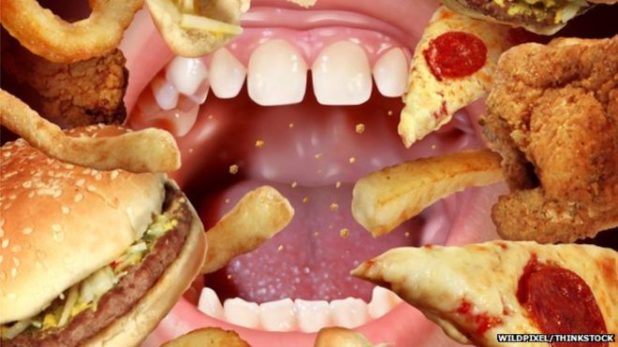Pomidor Quixote
Daily Stormer
October 24, 2019
“Not a disorder.”
Sometimes, people take a wrong turn while trying to escape Goyfeed Town.
Anorexia is twice as common among young children in the UK now than it was a decade ago, researchers claim.
Around 3.2 youngsters out of every 100,000 eight to 12-year-olds were diagnosed with the eating disorder in 2015.
This is double that of the estimated 1.5 cases per 100,000 in 2006, according to scientists at King’s College London.
Experts blamed the rise on social media, from the pressure to be ‘liked’ online and the abundance of fit celebrity images.
The problem isn’t that people want to have a likable body — the problem is that most people don’t know how to stop themselves from getting fatter and fatter.
Hospital admissions for eating disorders generally have doubled in the past six years in England, according to NHS figures also released today.
There were 19,116 occasions where patients were rushed into hospital last year, 532 of which were children under 12 years old.
There is no precise information on the overall prevalence of eating disorders, despite them having the highest death rates of all mental illnesses.
Some studies say up to 1.25million people suffer from eating disorders throughout the UK, while other figures estimate it to be closer to 600,000.
Prevalence estimates in young people under 20 range from 0.3 per cent to 0.6 per cent, the researchers said.
They should also count all versions of veganism as eating disorders too.
Also also, they should count being overweight as an eating disorder.
There should be zero tolerance for excess fat.
The rates of diagnosis rose steadily with age, peaking at the age of 16, according to the results published in the BMJ Open.
Around 30 cases of anorexia were diagnosed out of every 100,000 children aged between 14 and 16-years-old.
There are a number of risks for eating disorders, including genetics and personality traits – such as low self-esteem, obsessive personality or perfectionism.
Cultural pressures are increasingly becoming a problem, particularly in the form of social media, according to experts.
Alexia Dempsey, a specialist eating disorder dietitian at The Priory’s Roehampton Hospital in south-west London, who was not involved in the study, told MailOnline: ‘More than half of children, by the age of 10, have access to social media.
‘They will likely be viewing “idealised” or heavily edited pictures and images, as well as posting their own images for the external judgement of their peers and strangers in the form of “likes” and “shares”.’
Instagram and Facebook have an age limit of 13, but have been criticised in the past for failing to enforce the rule strictly.
Instagram bosses recently revealed it will censor posts glorifying or promoting cosmetic surgery and fat-burning products as part of a major clampdown on the causes fueling body image worries among youngsters.
What’s next? Blaming visually pleasing statues of the human body for eating disorders?
The problem is that people don’t know how to get the body that they want to have.
Social media contributes to this problem with “celebrities” not disclosing their use of steroids and such, but problems like anorexia are mostly the result of not knowing how to eat and get nutrition without gaining fat — a task certainly made more difficult by the popularity of goyfeed “food” products.
Ms Dempsey said: ‘It is easy to see how young minds might be influenced by, or obsess over, their favourite athlete or celebrity.
‘We also see young people who have heard “anti-obesity” messages and cut out sugar and “junk food” at school, or received information through media channels and then followed this advice regardless of their body weight being in normal range, in an attempt to feel healthy or “better about themselves”.
‘This lack of nutrition can lead to obsessional thoughts about food, impaired cognitive functioning and feelings of low mood and anxiety – and eventually an eating disorder.’
Leading eating disorder charity Beat conceded there is evidence anorexia – and eating disorders – are increasing in children.
Right. Fat-shaming and not wanting to be fat are to blame.
If they’re concerned about fixing eating disorders, they should concern themselves about fixing the food.
 Daily Stormer The Most Censored Publication in History
Daily Stormer The Most Censored Publication in History





